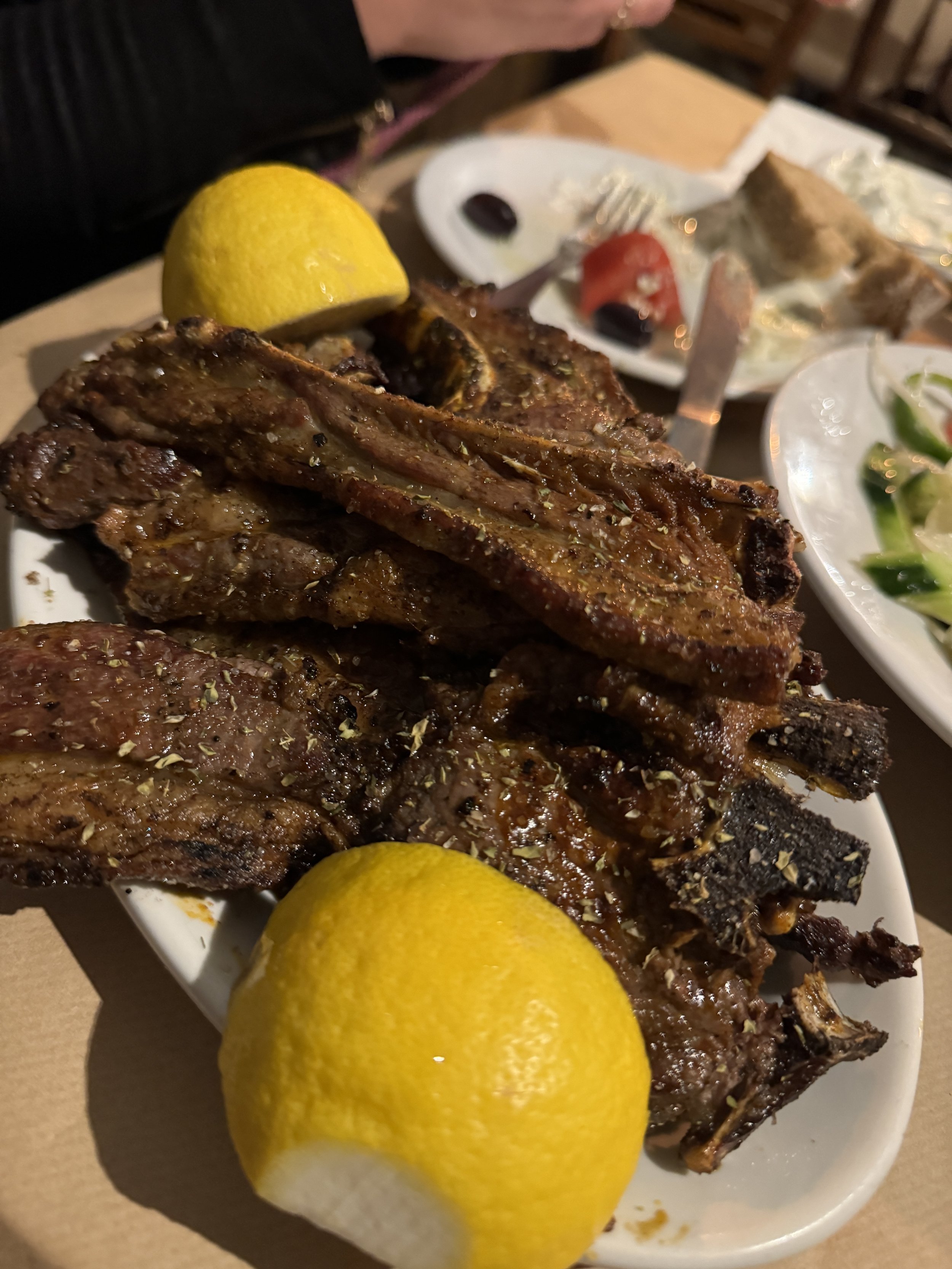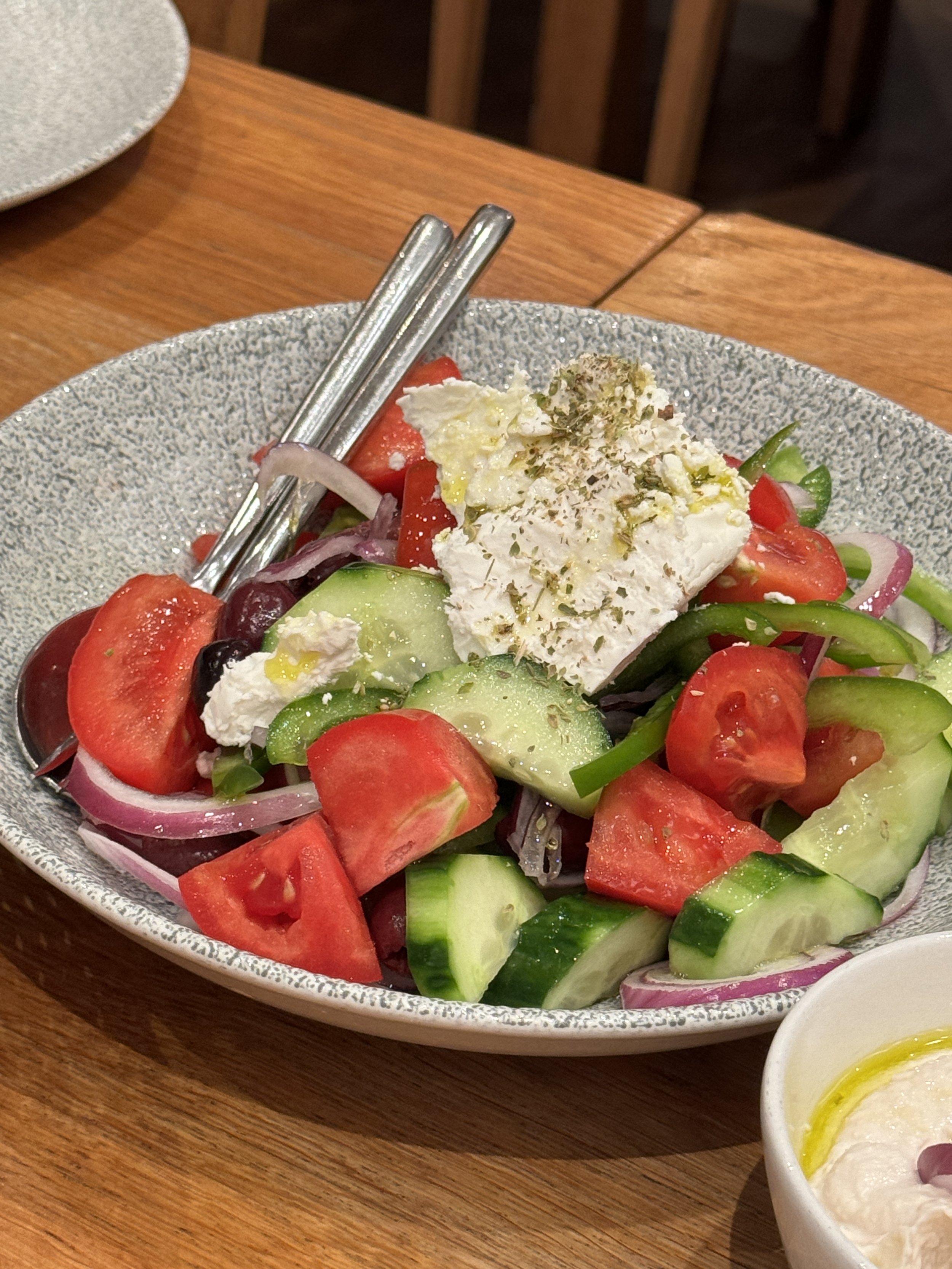The authentic Greek Taverna hidden Behind a bookshelf in a London basement. Is it real?
You’ve seen us write about about Greek food in London, as well as its shamelessly glaring misrepresentations. It’s no coincidence, then, that people went absolutely mad the moment we posted a video on Instagram showcasing what we consider to be the only authentic Greek restaurant in London.
You can find all of the details below.
The fact that – in just 2 days – hundreds of thousands of people watched, and tens of thousands shared, liked or commented on the video is testament to just how badly the London market is craving a real, honest, true, authentic, community-oriented, rustic, simple, traditional (Greek) taverna. Both in terms of its food and its atmosphere.
We’re talking good-quality grilled meat sourced from local butchers, homemade dips and pites, rare delicacies that you never find in London, and outrageously simple dishes like boiled greens (it will surprise you how good a bowl of greens can taste in Greece). Washed down with wine from the barrel that might not be a sommelier’s dream, but is the fuel of happy, hazy memories with friends, against a backdrop of live music that everyone is singing and clapping along with.
Community. Togetherness. Familiarity.
A real Greek taverna.
London’s Best Kept secret: a Greek restaurant hidden behind a bookshelf in a basement on Greek Street in Soho
One problem: this magical Greek taverna, hidden behind a secret door on a bookshelf, beneath Milroy’s on 3 Greek Street in London’s Soho, isn’t an oasis. It’s a mirage.
It doesn’t exist.
We thought the name – Elgin’s Basement (aka To Ypogeio tou Elgin) – would be enough of a giveaway, with a tongue-in-cheek allusion the British Museum’s intransigence when it comes to returning the Parthenon Marbles to their home. Instead, it turns out that not only hundreds of thousands of people fell for the prank, but hundreds are (still) turning up to the bar at 3 Greek Street in hope of finding a table – according to the team at 3 Greek Street. And this is where the story begins.
Beyond a historically successful April Fool’s prank, this whole saga has taught us all a lot about the reality of the restaurant scene in London, as well as where the demand lies. Unsurprisingly, as explained at the start, there is quite clearly strong demand for the rustic, family-run independents that focus on making food that is both good and affordable. The demand for it is so strong because the supply isn’t there.
So why doesn’t someone just open a restuarant like that?
These ‘authentic spots’ are built on much deeper and stronger foundations than just a clever business idea that fills a gap in the market. We ought to remember that behind the magic of the live band and the rustic romanticism of these spots, is the fact that they are run by and for local communities. Greeks don’t need to scour Instagram for authentic hidden treasures and rush there for their next gastro-Instagrammable hit of ecstasy – it’s something that you’ll naturally find in most neighbourhoods in the Mediterranean. The result is regulars who know each other and restaurants who treat their guests like family, not replaceable customers.
The atmosphere in those places reflects that – live music, people singing and dancing along, a constant, charming conversational buzz. Nothing is forced or rushed. People aren’t ushered in and out to maximise turnover, footfall and margin. Rather, people are welcomed and encouraged to spend the duration of their evening there. And they return. The goal is a good product, happy returning regulars and good times – not scaleability and hype – even if that means turning some business away on busy nights. It’s only logical that it’s more difficult to replicate that atmosphere in cosmopolitan cities where communities are fragmented, relationships are ephemeral and cohesion feels fleeting. That’s not to say we can’t have diverse communities that get along and build that anew.
What about the food? Likewise, when the focus is on quality instead of quantity and scale, magic happens. Good, simple, familiar, traditional and authentic food that the chefs tend to prepare in-house by hand. Sustainably sourced in reasonable quantities (at least most of the time), even if things sell out. The kind of food that everyone is familiar with, which makes us all happy deep-down inside, but is executed to a level that you can never seem to reproduce at home. These places have longevity, which translates into a mystical level of mastery over time. The kind of mastery that has you wondering how someone can make lamb chops with nothing but a touch of salt, oregano and paprika – or even just a bowl of greens – taste so good.
That’s the ideal. So, how is it still attainable in the Mediterranean but not in countries like the UK?
From April Fool’s joke to socioeconomic commentary
If we want good traditional (Greek) food in London, in a rustic and affordable setting, we have to acknowledge that a prerequisite is good-quality ingredients, grown and reared naturally by small, independent producers, who focus on quality and flavour instead of scale. To allow that to happen, we need to become less reliant on the larger supermarkets who compromise on flavour and nutrients while relying on pesticides known to harm human health and the environment. While the UK is grappling with a long-term decline in agricultural self-sufficiency (which has hit a rock-bottom 53% for fresh vegetables since 2023), it has observed a rise in megafarms that pour out low-nutrient, less-flavourful produce for the Big Six supermarket chains.
A culture of good food, unsurprisingly, depends on good quality ingredients that are accessible and affordable. When asked, ‘how does the food and natural produce taste so much better in the Mediterranean than in the UK or US?’, most Brits and Americans acquiescently put it down to one variable: ‘the climate’. With this misconception, consumers consent to mediocrity, even if the majority vocalise their objections when polls and surveys prompt them.
However, there is hardly scientific nor logical basis for the view that the climate is the driving factor. Reality says otherwise: some of the best tomatoes I’ve personally eaten grew in my grandfather’s allotment in the UK, just as an independent producer grew “one of the most delicious tomatoes on the planet” only to be turned down by supermarkets in the US, where consumers are also of the view that the produce tastes better in Europe. Waitrose (which behaves quite differently to the Big Six UK supermarket chains) sources delicious organic tomatoes from the Isle of Wight and Sussex when tomatoes are in season. They taste better because real, organic farms grow them seasonally. And if you go to London’s New Spitalfields market between the dead of night and the crack at dawn, you’ll find organic produce from a range of producers across Europe that put any supermarket shelf to shame. (To prove the point, go and try the Greek salad at Nissi in Palmers Green, made using ingredients sourced there, and you’ll realise 1- how much of a difference going out of the way to get good produce can make, and 2- how few the restaurants are that still do so.)
In other words, the common denominator when it comes to good produce seems to be who is growing it and how, not where. And it’s not necessarily true that all produce tastes better in the Mediterranean because it’s grown there – rather, it’s far more widely available thanks to a culture of independent producers who you can find on roadside stands and at farmers’ markets everywhere. That makes it accessible and affordable enough for people of all classes. Compare that to the UK, where just 10 retailers sell 95% of our food, and the problem becomes clear. It’s the smaller producers who don’t use an excess of chemicals to scale and expedite processes that are the clear winners when it comes to taste, nutrients and sustainability.
The future of affordable marketplaces that support a network of smaller producers looks bleak: London’s historical Smithfield (meat) and Billingsgate (fish) markets are set to close by 2028. And fresh plans to levy an inheritance tax on farmers means that over a third of farms could go out of business in the next 5 years. It’s a sobering reality that organisations like Riverford, Slow Food and Natoora have been addressing for years now. As the food crisis in the UK starts to gather attention with the compounding affect on public health becoming harder to ignore, more startups like Tonic Health and Dunkelds are finding opportunities to fill the gap in the market for real food and health in a country where the average diet now mostly consists of ultra-processed foods known to harm.
On the other hand, Greeks and Greek restaurant owners don’t have to go out of their way quite as much or pay too much more for good produce. Many still enjoy fresh, organic ingredients on their doorsteps. Sometimes direct from local producers who they know personally, or from the persisting network of farmers’ markets that run in every neighbourhood. Granted, Greeks import a lot of meat and veg too, but the point is that the ideal of locally-sourced, organic ingredients is still available and affordable to the masses. There are still local economies, even shadow economies, and a culture of independent business ownership built around that fact in much of the Med. Unfortunately, it’s a reality that’s fading there too…
The Greek salad at Nissi in Palmers Green is a London anomaly and case study in and of itself.
How to bring authentic Greek cuisine to London
To have all of this in London means inspiring a culture of independent, family-run businesses again. It means having an agricultural sector that is not hijacked by multinationals who build megafarms reliant on chemicals and unethical practices. It means reviving local communities and local economies that are built on independent business ownership and human connection. Where restaurants can easily and affordably source local, natural, organic ingredients that create delicious, simple and affordable meals – without having to price out the masses because good produce costs a premium. If fast food chains and ultra-processed products from supermarkets are beginning to look more affordable, convenient, and familiar than real food… then something is very wrong.
Further, all of this depends on local, long-term connections that persist. It depends on family businesses and their customer bases surviving from generation to generation, i.e. where the grandchildren of the owners still host the grandchildren of the original regulars, which is a fact of life in the kind of taverna we deceitfully transposed to London’s Soho. That’s why people seem to be having such a good time there; many of them have known each other for years. There is trust and openness. It takes more than policy to revive and support local economies – it’s up to us and our choices to support one another. We can’t control our politicians, who are getting a little too comfortable enacting policies without mandates, but we have the power to shift our habits as consumers for collective good.
Those of you who have spent time in the Mediterranean would have likely noticed just how many more independent businesses there are that have been around for decades, sometimes more than a century. The same is not true to anywhere near the same degree in London. The situation was painfully summarised in the comments section of our ‘April Fool’s’ admission post: one user recognising a family-run Cypriot taverna in London with good food and good music, with another chipping in to notify them that it had closed down months ago. We’re not saying these places don’t exist at all – we’re saying that are improbable and that the odds are stacked against them in certain economies.
To change that requires more than a long, hard conversation with the people in Westminster: it means finding a way to limit the ginormous asset managers and super-rich who, over the years, come crisis or growth, have swallowed a greedy excess of commercial and residential property in major cities and priced ordinary people out of them (it’s also worth remembering that the richest 1% already own more wealth than 95% of everyone on earth). In short and at risk of stating the obvious: it’s very hard to run a Greek taverna in the heart of London that is authentic, affordable and profitable. The rents are unnecessary and unnaturally high because of the wealth divide. This makes thriving local economies and happy communities built on a network of family businesses an increasingly rare exception, and puts the pressure on hospitality businesses to boost turnover and footfall as much as they can to make it worthwhile.
What can we do about it?
A broken food system is a symptom of a system that is broken. We can either bury our heads in the sand and distract ourselves chasing after influencer-driven hype just to feel something. Or we can face reality and jump off the treadmill with the dangling carrot that is always almost always – but never quite – in reach. A simple short-term solution is to get a yearly ration of good food on holiday and at pricey restaurants most can only afford to dine at once a month. That’s not a solution. People around the world reading this are experiencing the same cost of living crisis, with the same root issues – and the cracks have already begun to emerge in the Mediterranean too, i.e. wherever wealthy interests are commercialising agriculture as people leave their hometowns and agriculture for cities and corporate jobs.
That’s why it’s more important now than ever to support the independents keeping good food and good times alive. We can do so by avoiding the largest supermarkets and chains as much as possible, and instead turning to independent, artisan and family-run traders, farmers’ markets and street-food vendors who show up every day with integrity. That way, the money flows back to real families and real people who make real food – not super-rich entities and individuals who never set foot on farms or care for their produce. When we opt for local independents over multinational chains, our money stays in our communities, instead of being exported to wealthy overseas shareholders. Only that way can we have towns and neighbourhoods everywhere with butchers, greengrocers, fishmongers and bakeries, better quality food, happier and healthier people, and buzzing local neighbourhoods. All of that is impossible if the money continues to flow into the hands of the giant competitors who have already put most independents out of business.
Most of these problems are logical outcomes. In a system where the emphasis is on individual financial gain rather than community and collective good, greed and exploitation are only natural outcomes. Equally, in cities with large corporate sectors where routines are dictated by long working hours and longer-than-natural commutes, it’s more convenient to pass by one of many chains than travel further just to support dwindling local businesses. And another issue we are yet to address: gangs are making it increasingly difficult for independent businesses in North London, whether it’s by demanding protection money or through hostile takeovers of independent shops perfect for laundering money (we have countless stories of this, and most are common knowledge in North London). At some point, policy and law enforcement will have to do it’s job too.
That’s what it really takes to create the kind of traditional Greek taverna that hundreds of thousands of people on the internet fell in love with at the start of April 2025. Anyone can make a basement bar look like a traditional Greek taverna. But they will never be able to replicate the true essence and magic of it without all that.
As the old adage goes: it takes an entire village to raise a child.
Thank you to Stephen and the team at 3 Greek Street for seeing the funny side, despite a barrage of footfall trying to track down the mystery hidden Greek restaurant that is actually a speakeasy bar called The Vault, 3 Greek Street, Soho. Apologies if you fell for it.




